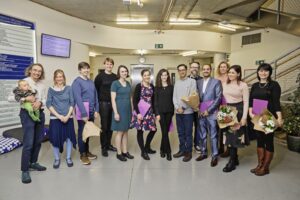The recipients of the 2024 Martina Roeselová Memorial Fellowship, which provides financial support to young scientists caring for a preschool-aged child, have been chosen. IOCB Tech Foundation has announced the names of the ten new awardees, who will share a total 1.5 million Czech crowns.
A grant of 150,000 Czech crowns is awarded to postgraduate students and postdoctoral researchers working in the field of natural sciences at universities and non-university research institutions in the Czech Republic who are simultaneously caring for a preschool-aged child. The financial support is intended to cover childcare services, allowing scientists to continue their studies or research at the beginning of parenthood without losing touch with global science.
“Successful juggling of cutting-edge science and parenthood is the dream of many, but only a few achieve it. To increase the chances of making this dream a reality, we provide grants to young researchers to help them remain excellent parents while continuing to actively pursue their own research,” explains Barbara Eignerová, chairwoman of the IOCB Tech Foundation managing board.
The Martina Roeselová Memorial Fellowship commemorates the memory of internationally recognized scientist Martina Roeselová of the Institute of Organic Chemistry and Biochemistry of the Czech Academy of Sciences, which is where the fellowship was established. It has been awarded since 2016, and to date thirty-five young researchers from various Czech universities and research institutions have received it, including Dr. Kateřina Sam of Biology Centre CAS, a later recipient of an ERC Starting Grant, and Dr. Lenka Gahurová, the recently appointed head of the Developmental Epigenetics and Bioinformatics Laboratory at the Faculty of Science, University of South Bohemia.
“It kind of takes my breath away to see how, thanks to the support of the foundation, the Martina Roeselová Memorial Fellowship has gone from humble beginnings to something that helps dozens of young researchers combine scientific work with care for preschool children,” says the fellowship’s founder and coordinator of the evaluation committee, Prof. Pavel Jungwirth. “I’m thrilled that the recipients are not only mothers but also fathers and that the quality of the applications is getting better and better, even though that does, of course, make it harder for us to choose. I believe Martina is looking down on our efforts from her scientific heaven with a compassionate smile and is, perhaps, pleased.”
The recipients of the 2024 Martina Roeselová Memorial Fellowship are:
- Eva Bártová (Faculty of Science, University of Ostrava)
- Michaela Capandová (Faculty of Medicine / Institute of Computer Science, Masaryk University)
- Suada Djukaj (Faculty of Chemical Engineering, University of Chemistry and Technology Prague)
- Martina Greplová Žáková, PhD (ELI Beamlines)
- Jana Junová (Faculty of Mathematics and Physics, Charles University)
- Mykhailo Khytko (Faculty of Mathematics and Physics, Charles University / Institute of Physics of the Czech Academy of Sciences)
- Ali Masihi (Faculty of Science, Charles University)
- Tereza Novotná Jaroměřská (Faculty of Science, Charles University)
- Veronika Prozorova (Faculty of Nuclear Sciences and Physical Engineering, Czech Technical University)
- Waheed Ur Rahman, PhD (Institute of Microbiology, Czech Academy of Sciences)
Martina Greplová Žáková
Martina Greplová Žáková, PhD, is a graduate of the Faculty of Nuclear Studies and Physical Engineering at the Czech Technical University in Prague, where she received a master’s degree in physics and technology of thermonuclear fusion and a doctorate in physical engineering. She has worked in a scientific environment since her bachelor’s studies, specifically at a research laser center ELI Beamlines within the European consortium ELI ERIC. Here, she developed professional skills in numerical particle-in-cell simulations of a laser pulse interaction with matter and the subsequent acceleration of ions. In her work, she uses supercomputers, numerical mathematics, and plasma physics theory. Her simulations support the optimization of the accelerated particle beam parameters, thus having potential in many interdisciplinary applications, e.g. in medicine, chemistry, biology, and nuclear physics but also in nondestructive heritage testing. She is mother to two-year-old identical twins Jéra and Nik.


Photos: Libor Fojtík.





